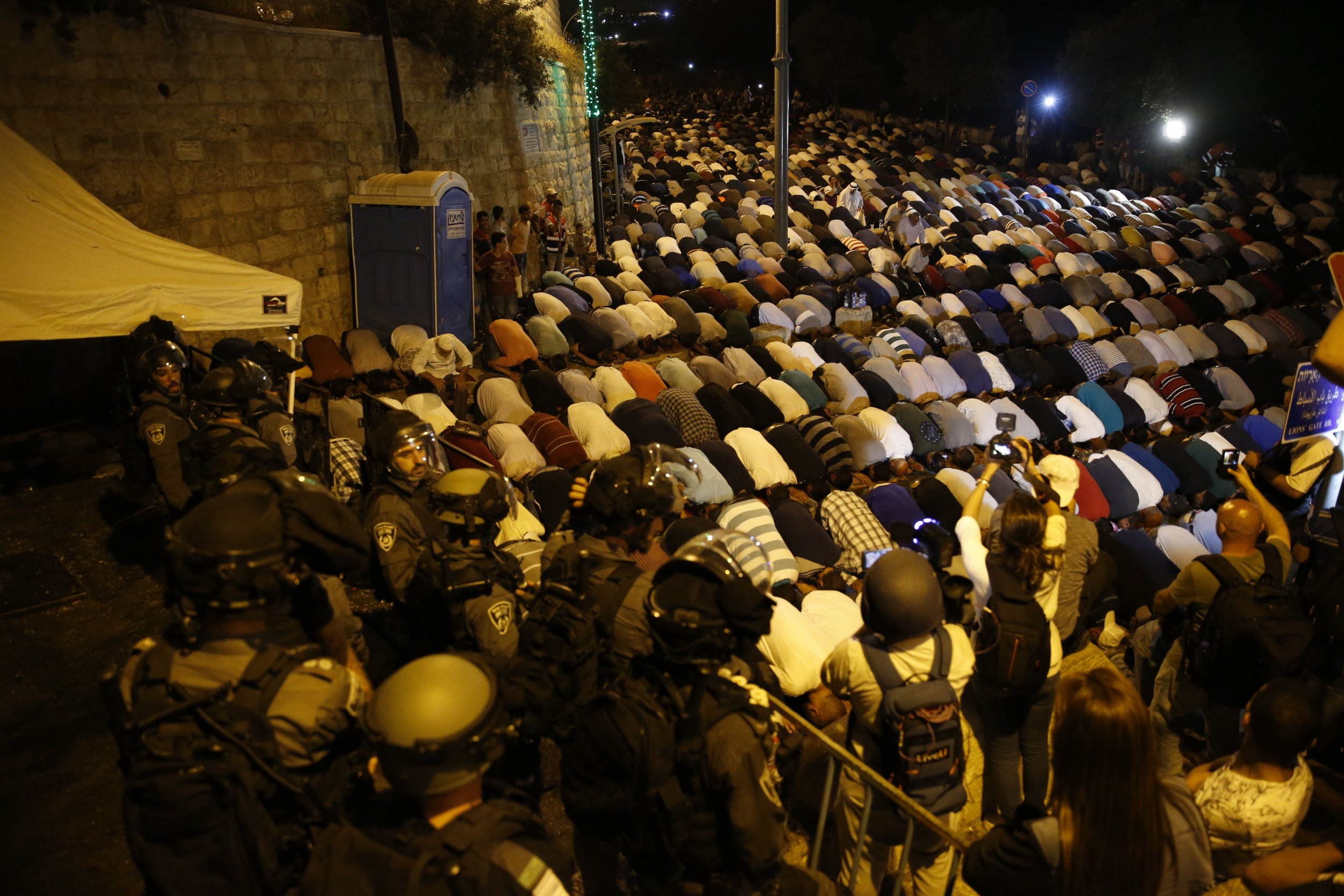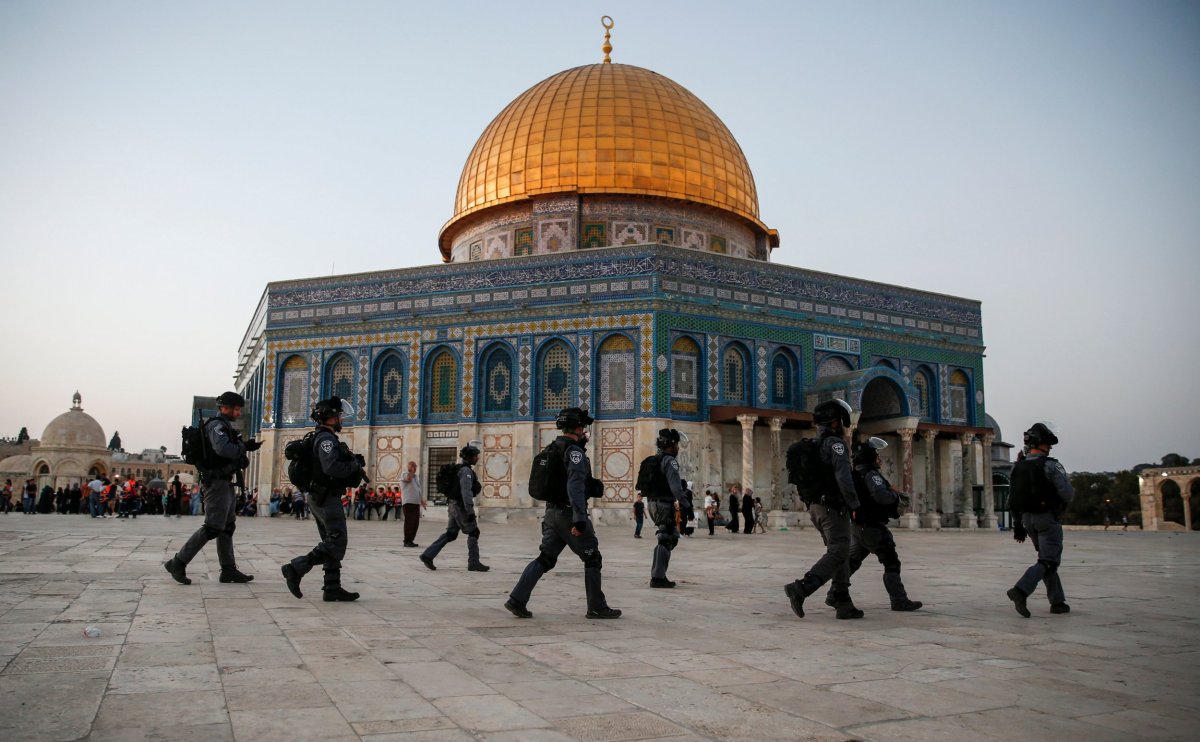
The Temple Mount of the Jews, the Haram al-Sharif (Noble Sanctuary) of the Muslims, has always been much more than a religious symbol. Over the years, this site of the two religions has become a national symbol, a political asset and one of the sacred values to both sides. Despite its centrality in the Palestinian ethos, the Palestinians have no official status on the Temple Mount.
Even after the Six-Day War, Israel was careful to preserve the reality in which the Temple Mount was administered by the Jordanian waqf and recognized the special status of Jordan's custodianship—one enshrined in the 1994 peace agreement, which explicitly recognizes Jordan's special interests there.
But the Temple Mount has become an ax to grind, a political lever used to establish public legitimacy and mass mobilization among the Palestinian public for the struggle against Israel, and exploited to mobilize Muslims to both back the Palestinian national struggle and erode Israel's status. And it is done at the cost of undermining security, even if it means the loss of human life.
The political leverage of the Temple Mount since the opening of the exit to the Western Wall Tunnel in September 1996 has been steeped in religious incitement led by Sheikh Raed Salah, leader of the northern branch of the Islamic Movement in Israel, who has succeeded in establishing his position in the Islamic world as "Sheikh Al-Aqsa."
Salah has led the "Al-Aqsa in Danger" public campaign in which he cultivates lies about Israeli plots to undermine the foundations of the Al-Aqsa mosque, alleging Israel is destroying it in order to build the third Jewish temple. Despite the government of Israel taking great pains to preserve the status quo, Salah's campaign attracts followers among believers who don't care to investigate Salah's wild accusations.
Salah's movement is a branch of the Muslim Brotherhood, and his propaganda campaign is supported by Hamas, itself a branch of the Brotherhood, and by Turkey, led by President Recep Tayyip Erdogan, which is the Turkish branch of the Brotherhood. Salah has succeeded in stabilizing a coalition of political Islamic movements and creating a dangerous and destructive triangle of political Islam in the most sensitive and explosive region in the Middle East.
The Palestinian Authority (PA), under Mahmoud Abbas in the West Bank, is identified as part of the pragmatic Sunni camp. Tensions between the PA and Hamas, which controls Gaza, are increasing and deepening the split between the territories. Abbas's recent moves aimed at weakening Hamas have crossed previous red lines in the internal Palestinian relationship.
PA sanctions aimed at weakening Hamas's grip on power in Gaza have severely affected Palestinians with cuts in salaries and slashing payments for fuel, leaving Gazans with barely a few hours of electricity daily. To ease the distress, Hamas was forced to deepen its cooperation with Egypt with the involvement of Abbas's bitter rival and political enemy, ousted Fatah strongman Mohammad Dahlan.
Hamas continues its methodical efforts to undermine the stability of the PA, seeking to join the Palestinian Liberation Organization (PLO) in order gain control of it and establish Hamas as leader of the Palestinians. In this framework, Hamas identified the Temple Mount as a convenient focal point for undermining the stability of Abbas and systematically provokes the Palestinians. Hamas is aided by Turkey, which greatly increased its activity and presence on the Temple Mount and in East Jerusalem in general, all orchestrated by Sheikh Raed Salah.
Erdogan is seeking to establish Turkey's regional status as an influential player by weakening Jordan's status on the Temple Mount and strengthening Hamas and the Islamic Movement in Israel—two sister movements of Turkish political Islam. Hamas has been seeking a foothold in Jerusalem to incite the West Bank against the PA while undermining stability in Israel, including through desecration in the use of terror on the holy site and the undermining of security.

Hamas cultivates Salah's Islamic Movement in Israel to establish its status as an Islamic resistance movement and an arrowhead in the struggle against Israel. The Temple Mount is thus an expedient lever for these three players, and throwing flaming matches into the barrel of explosives has become the preferred means. Lighting the bonfire and increasing the flames serves the individual interests of each and the common interests of all three.
The three Arab murderers who desecrated the sanctity of the holy site by shooting the Israeli police officers two weeks ago are the pioneers of the Islamic movement, whose image has been overhauled and inflamed. The three became martyrs, heroes in the eyes of their community and leaders as well as in the eyes of Hamas and Turkish President Erdogan. The PA, Abbas and the Fatah movement are dragged into the burning fire, and to prevent Hamas from achieving any achievements they must portray themselves as Al-Aqsa's defenders and contribute their share of incitement.
The Jordanians, who seek to preserve their status on the Temple Mount and understand the magnitude of the danger, work to establish understandings with Israel and restore calm, but the royal family is subject to pressures from within, led by the Muslim Brotherhood in Jordan.
Israel is forced to maneuver with the fire hose between the pyromaniacs, who all seek to burn the place. Israel is not immune from mistakes, and in the delicate maneuvering, mistakes are made and it's good that they are being corrected. However, it is important and right to understand the events on the Temple Mount as a reflection of the broader regional reality.
That which takes place in this holy place reflects a cynical reality in which religion becomes the guardian of politics in the fierce struggle between the camps in the Middle East and a dangerous weapon in the hands of political Islam. When we're talking about a place that is so volatile and explosive, it is important to beware of pyromaniacs and keep them far away from there.
Kobi Michael is the former deputy director general and head of the Palestinian desk at Israel's Ministry of Strategic Affairs, and is a senior research fellow at the Institute for National Security Studies at Tel Aviv University and the Jerusalem Institute for Policy Research.
Uncommon Knowledge
Newsweek is committed to challenging conventional wisdom and finding connections in the search for common ground.
Newsweek is committed to challenging conventional wisdom and finding connections in the search for common ground.
About the writer
To read how Newsweek uses AI as a newsroom tool, Click here.








